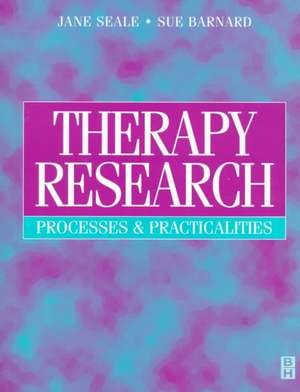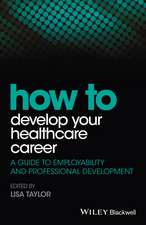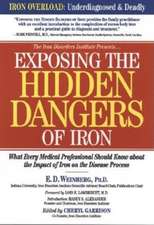Therapy Research
en Limba Engleză Paperback – 7 sep 1998
Jane Seale BSc (Hons), PhD and Sue Barnard MSc, MCSP are both Lecturers at the School of Occupational Therapy and Physiotherapy, Southampton, UK
Preț: 234.12 lei
Preț vechi: 246.45 lei
-5% Nou
Puncte Express: 351
Preț estimativ în valută:
44.81€ • 48.69$ • 37.67£
44.81€ • 48.69$ • 37.67£
Carte tipărită la comandă
Livrare economică 21 aprilie-05 mai
Preluare comenzi: 021 569.72.76
Specificații
ISBN-13: 9780750634359
ISBN-10: 0750634359
Pagini: 256
Ilustrații: 37 ills.
Dimensiuni: 189 x 246 x 14 mm
Greutate: 0.47 kg
Editura: Butterworth-Heinemann
Locul publicării:United Kingdom
ISBN-10: 0750634359
Pagini: 256
Ilustrații: 37 ills.
Dimensiuni: 189 x 246 x 14 mm
Greutate: 0.47 kg
Editura: Butterworth-Heinemann
Locul publicării:United Kingdom
Public țintă
Physiotherapy and occupationsl therapy students; practitioners and sppech therapists, podiatrists, osteopaths, chiropractors.Cuprins
Acknowledgements; Preface; What is research and why do therapists need to do it?; From research approaches to research questions; From research questions to resesarch methodologies; Data collection methods: questionnaires; Data collection methods: interview; Data collection methods: observation; Measuring and measurement tools in research; Reliability and validity; Principles of analysing data; Analysis of questionnaires; Analysis of interviews; Analysis of observations; Practical considerations; Ethical and moral considerations; Writing a research proposal; Costing your research project and seeking funds; Writing up your research: presenting your results; Writing up your research: discussing your results; Disseminating research findings; One step forwards or one step backwards; Answers to exercises.
Recenzii
'This book has the stated aim of demystifying the research process and discussing it in practical terms. As such it is targeted at undergraduate and qualified physiotherapists and occupational therapists who consider themselves new to research.
The book consists of 20 chapters covering the spectrum of research from the initial research idea to its dissemination. The first three chapters address research question development and research methodologies. Chapters four to eight concern issues to do with data collection including reliability and validity. Data analysis is covered in chapters nine to twelve. The remaining chapters discuss practicalities of research, ethical considerations, funding and communication of research.
Each chapter is well laid out with clear and relevant sub-headings. Examples are clearly highlighted and practical hints are presented frequently throughout the text. A summary of key points and a comprehensive reference list are given after each chapter. Admirably, some chapters offer the reader to work through examples which are then discussed at the end of the book...
An attractive aspect of this book is that it introduces the reader to the use of SPSS to analyze data...
The authors are to be commended for this book. They have produced an informative, readable and comprehensive piece of work for their intended market. At £18.99 it represents excellent value as a textbook for students and practitioners wishing to gain an initial grounding in research.'
Denis Martin DPhil BSc(Hons) MCSP
Lecturer, Dept. of Physiotherapy, Queen Margaret College, Edinburgh, UK
Reviewing in Physiotherapy Research International, Feb 1999.
"For those interested in an overview of many issues relevant to research within the profession, this book will provide useful information. The chapters pass from discussing the issues around why therapists need to be involved in research, through some of the writing processes involved, and conclude with advice on writing up research findings and disseminating the results.
One chapter of particular interest is that on ethical and moral considerations. It poses some useful questions and helps readers to understand the nature of ethical issues in research. The chapter about writing the research proposal will also help those new to the research process to formulate a basic document.
The text contains many gems of information and useful examples....
The text covers a description of many current methodologies and approaches to research and some of the advantages and disadvantages of each approach. From this perspective it may be particularly useful as a reference book for those supervising student research projects."
Michele Harms PhD MSc MCSP
Physiotherapy Frontline, Feb. 1999
'... successful in presenting research in a way that will be of equal interest and relevance to occupational therapists and physiotherapists.'
Manual Therapy (1999) 4(2) 110-112
'This excellent and informative book would be an asset to any student or practising therapist.' - Therapy Weekly, Jan. 2000
'This book has the stated aim of demystifying the research process and discussing it in practical terms. As such it is targeted at undergraduate and qualified physiotherapists and occupational therapists who consider themselves new to research. The bookconsists of 20 chapters covering the spectrum of research from the initial research idea to its dissemination. The first three chapters address research question development and research methodologies. Chapters four to eight concern issues to do with datacollection including reliability and validity. Data analysis is covered in chapters nine to twelve. The remaining chapters discuss practicalities of research, ethical considerations, funding and communication of research. Each chapter is well laid out with clear and relevant sub-headings. Examples are clearly highlighted and practical hints are presented frequently throughout the text. A summary of key points and a comprehensive reference list are given after each chapter. Admirably, some chapters offer the reader to work through examples which are then discussed at the end of the book... An attractive aspect of this book is that it introduces the reader to the use of SPSS to analyze data... The authors are to be commended for this book. They have produced an informative, readable and comprehensive piece of work for their intended market. At ?18.99 it represents excellent value as a textbook for students and practitioners wishing to gain an initial grounding in research.' Denis Martin DPhil BSc(Hons) MCSPLecturer, Dept. of Physiotherapy, Queen Margaret College, Edinburgh, UKReviewing in Physiotherapy Research International, Feb 1999. "For those interested in an overview of many issues relevant to research within the profession, this book will provide useful information. The chapters pass from discussing the issues around why therapists need to be involved in research, through some of the writing processes involved, and
The book consists of 20 chapters covering the spectrum of research from the initial research idea to its dissemination. The first three chapters address research question development and research methodologies. Chapters four to eight concern issues to do with data collection including reliability and validity. Data analysis is covered in chapters nine to twelve. The remaining chapters discuss practicalities of research, ethical considerations, funding and communication of research.
Each chapter is well laid out with clear and relevant sub-headings. Examples are clearly highlighted and practical hints are presented frequently throughout the text. A summary of key points and a comprehensive reference list are given after each chapter. Admirably, some chapters offer the reader to work through examples which are then discussed at the end of the book...
An attractive aspect of this book is that it introduces the reader to the use of SPSS to analyze data...
The authors are to be commended for this book. They have produced an informative, readable and comprehensive piece of work for their intended market. At £18.99 it represents excellent value as a textbook for students and practitioners wishing to gain an initial grounding in research.'
Denis Martin DPhil BSc(Hons) MCSP
Lecturer, Dept. of Physiotherapy, Queen Margaret College, Edinburgh, UK
Reviewing in Physiotherapy Research International, Feb 1999.
"For those interested in an overview of many issues relevant to research within the profession, this book will provide useful information. The chapters pass from discussing the issues around why therapists need to be involved in research, through some of the writing processes involved, and conclude with advice on writing up research findings and disseminating the results.
One chapter of particular interest is that on ethical and moral considerations. It poses some useful questions and helps readers to understand the nature of ethical issues in research. The chapter about writing the research proposal will also help those new to the research process to formulate a basic document.
The text contains many gems of information and useful examples....
The text covers a description of many current methodologies and approaches to research and some of the advantages and disadvantages of each approach. From this perspective it may be particularly useful as a reference book for those supervising student research projects."
Michele Harms PhD MSc MCSP
Physiotherapy Frontline, Feb. 1999
'... successful in presenting research in a way that will be of equal interest and relevance to occupational therapists and physiotherapists.'
Manual Therapy (1999) 4(2) 110-112
'This excellent and informative book would be an asset to any student or practising therapist.' - Therapy Weekly, Jan. 2000
'This book has the stated aim of demystifying the research process and discussing it in practical terms. As such it is targeted at undergraduate and qualified physiotherapists and occupational therapists who consider themselves new to research. The bookconsists of 20 chapters covering the spectrum of research from the initial research idea to its dissemination. The first three chapters address research question development and research methodologies. Chapters four to eight concern issues to do with datacollection including reliability and validity. Data analysis is covered in chapters nine to twelve. The remaining chapters discuss practicalities of research, ethical considerations, funding and communication of research. Each chapter is well laid out with clear and relevant sub-headings. Examples are clearly highlighted and practical hints are presented frequently throughout the text. A summary of key points and a comprehensive reference list are given after each chapter. Admirably, some chapters offer the reader to work through examples which are then discussed at the end of the book... An attractive aspect of this book is that it introduces the reader to the use of SPSS to analyze data... The authors are to be commended for this book. They have produced an informative, readable and comprehensive piece of work for their intended market. At ?18.99 it represents excellent value as a textbook for students and practitioners wishing to gain an initial grounding in research.' Denis Martin DPhil BSc(Hons) MCSPLecturer, Dept. of Physiotherapy, Queen Margaret College, Edinburgh, UKReviewing in Physiotherapy Research International, Feb 1999. "For those interested in an overview of many issues relevant to research within the profession, this book will provide useful information. The chapters pass from discussing the issues around why therapists need to be involved in research, through some of the writing processes involved, and





